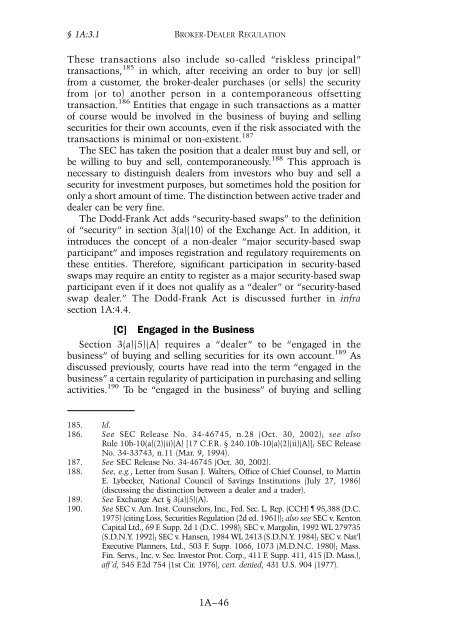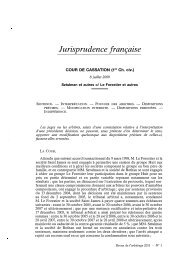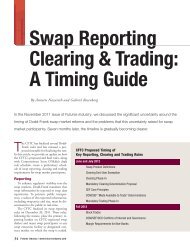What is a Broker-Dealer? - Davis Polk & Wardwell
What is a Broker-Dealer? - Davis Polk & Wardwell
What is a Broker-Dealer? - Davis Polk & Wardwell
You also want an ePaper? Increase the reach of your titles
YUMPU automatically turns print PDFs into web optimized ePapers that Google loves.
§ 1A:3.1 BROKER-DEALER REGULATION<br />
These transactions also include so-called “r<strong>is</strong>kless principal”<br />
transactions, 185 in which, after receiving an order to buy (or sell)<br />
from a customer, the broker-dealer purchases (or sells) the security<br />
from (or to) another person in a contemporaneous offsetting<br />
transaction. 186 Entities that engage in such transactions as a matter<br />
of course would be involved in the business of buying and selling<br />
securities for their own accounts, even if the r<strong>is</strong>k associated with the<br />
transactions <strong>is</strong> minimal or non-ex<strong>is</strong>tent. 187<br />
The SEC has taken the position that a dealer must buy and sell, or<br />
be willing to buy and sell, contemporaneously. 188 Th<strong>is</strong> approach <strong>is</strong><br />
necessary to d<strong>is</strong>tingu<strong>is</strong>h dealers from investors who buy and sell a<br />
security for investment purposes, but sometimes hold the position for<br />
only a short amount of time. The d<strong>is</strong>tinction between active trader and<br />
dealer can be very fine.<br />
The Dodd-Frank Act adds “security-based swaps” to the definition<br />
of “security” in section 3(a)(10) of the Exchange Act. In addition, it<br />
introduces the concept of a non-dealer “major security-based swap<br />
participant” and imposes reg<strong>is</strong>tration and regulatory requirements on<br />
these entities. Therefore, significant participation in security-based<br />
swaps may require an entity to reg<strong>is</strong>ter as a major security-based swap<br />
participant even if it does not qualify as a “dealer” or “security-based<br />
swap dealer.” The Dodd-Frank Act <strong>is</strong> d<strong>is</strong>cussed further in infra<br />
section 1A:4.4.<br />
[C] Engaged in the Business<br />
Section 3(a)(5)(A) requires a “dealer” to be “engaged in the<br />
business” of buying and selling securities for its own account. 189 As<br />
d<strong>is</strong>cussed previously, courts have read into the term “engaged in the<br />
business” a certain regularity of participation in purchasing and selling<br />
activities. 190 To be “engaged in the business” of buying and selling<br />
185. Id.<br />
186. See SEC Release No. 34-46745, n.28 (Oct. 30, 2002); see also<br />
Rule 10b-10(a)(2)(ii)(A) [17 C.F.R. § 240.10b-10(a)(2)(ii)(A)]; SEC Release<br />
No. 34-33743, n.11 (Mar. 9, 1994).<br />
187. See SEC Release No. 34-46745 (Oct. 30, 2002).<br />
188. See, e.g., Letter from Susan J. Walters, Office of Chief Counsel, to Martin<br />
E. Lybecker, National Council of Savings Institutions (July 27, 1986)<br />
(d<strong>is</strong>cussing the d<strong>is</strong>tinction between a dealer and a trader).<br />
189. See Exchange Act § 3(a)(5)(A).<br />
190. See SEC v. Am. Inst. Counselors, Inc., Fed. Sec. L. Rep. (CCH) 95,388 (D.C.<br />
1975) (citing Loss, Securities Regulation (2d ed. 1961)); also see SEC v. Kenton<br />
Capital Ltd., 69 F. Supp. 2d 1 (D.C. 1998); SEC v. Margolin, 1992 WL 279735<br />
(S.D.N.Y. 1992); SEC v. Hansen, 1984 WL 2413 (S.D.N.Y. 1984); SEC v. Nat’l<br />
Executive Planners, Ltd., 503 F. Supp. 1066, 1073 (M.D.N.C. 1980); Mass.<br />
Fin. Servs., Inc. v. Sec. Investor Prot. Corp., 411 F. Supp. 411, 415 (D. Mass.),<br />
aff’d, 545 F.2d 754 (1st Cir. 1976), cert. denied, 431 U.S. 904 (1977).<br />
1A–46





